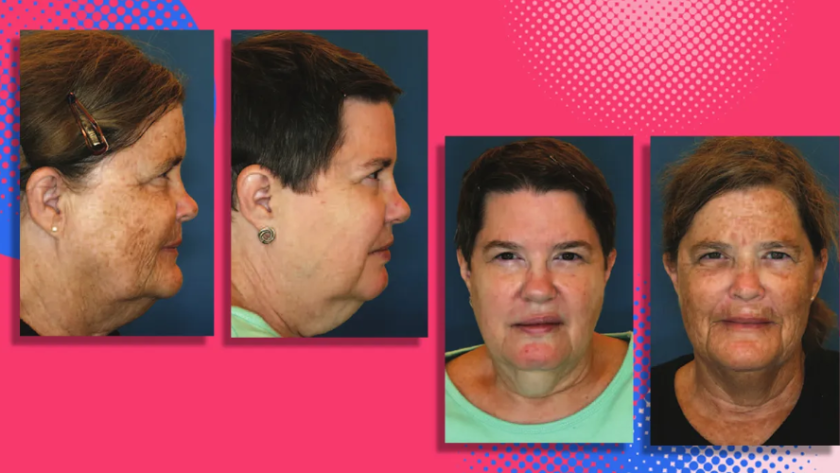Protecting your skin is obviously No. Protecting your skin is No. 1 in terms of SPF. But does your daily sunscreen prevent wrinkles?
“Research has shown that consistent sunscreen use does have anti-aging effects on the skin,” says Dr. Jeannette Graf is a board-certified dermatologist and an assistant clinical professor of dermatology at Mount Sinai School of Medicine. “While wrinkles and aging are inevitable, sunscreen can help slow the process.”
What does sunscreen do to slow down the aging process? Let’s see what science and Graf say about sunscreen’s antiaging effects.
What does sunscreen do to prevent wrinkles and premature aging?
Sunscreen either creates a layer on the skin that physically blocks or has chemicals that absorb harmful UV rays (mostly UVA and UVB). This helps prevent sunburn, skin cancer, and the breakdown of collagen which results in wrinkles.
Basically, without SPF, your skin tries to protect itself from the sun’s harsh rays by producing thick, splotchy pigment (hello, fried skin and sunspots). So, even though your skin means well, chances are you won’t love the results and your skin is being damaged.
Photo damaged skin is characterized by:
- Loss of skin elasticity
- Volume loss (sagging face)
- Increased skin roughness
- Drier skin
- Uneven pigmentation
- Skin wrinkles
Graf states that although photoaging can’t be completely avoided, it can be prevented if you take the right steps.
Graf also noted that “chronic sunlight exposure significantly increases the rate at which wrinkles occur.” According to 2019 research, about 80 percent of facial aging is due to sun exposure. Lifestyle, genetics, and medical factors all play a part.
Before you reach for the retinol and peptide serums, Graf says: “Sunscreen” is the best anti-aging tool available!”
Using sunscreen vs Not using sunscreen
Now you understand a bit about sunscreen science, here are some receipts to prove it’s worth applying every day.
Graf notes that in addition to preventing skin cancer, “the use of sunscreen is beneficial for sagging, wrinkles, redness, textured skin, and skin damage.”
According to research, a 2016 study found that people who used broad-spectrum sunscreen with SPF30 daily for a year had improved skin texture and clarity. Pro tip: Higher SPF is better.
A 4-year study also reported folks who were told to apply sunscreen regularly were 24 percent less likely to show increased signs of aging compared to people who didn’t receive any instructions.
These photos show identical twins showing how prolonged sun exposure can cause more damage over the years.

How to screen for sunscreens: Which SPF is best?
What sunscreens work best to prevent wrinkles and aging?
Here are the recommendations of Graf and AAD for sunscreens:
Broad-spectrum. Look for a broad-spectrum sunscreen that protects against both harmful UVA and UVB rays.
SPF 30+. Graf recommends using sunscreen with at least 50 SPF for maximum protection. However, the AAD and many dermatologists recommend at least SPF 30. What is the difference? SPF 50 blocks about 98 percent of UVB rays, while SPF30 blocks 96.7 percent.
Mineral sunscreens. “While chemical sunscreens work to absorb the UV [rays], mineral sunscreens block the sun’s UV rays from hitting the skin,” says Graf. Bonus: mineral-based sunscreens block the short and long UVA rays responsible for aging, while some chemical sunscreens don’t. Graf recommends mineral sunscreens with zinc oxide, which can be applied to the sensitive eye area without causing burning.
Avoid potentially harmful chemical ingredients. Oxybenzone and octinoaxate are just two of a long list of chemical sunscreen ingredients harming aquatic life like coral reefs. The FDA has also found these chemicals in human blood samples and is re-evaluating a number of chemical sunscreen ingredients due to blood absorption concerns. These chemicals may not cause skin irritation, but we don’t know for sure.
Sunblock over SPF makeup. “Although there are makeups which contain SPF, they are not as protective as an actual sunblock,” Graf says. This is partly because the moisturizer content can dilute that precious SPF. Even if your makeup is UV-protective, it’s worth adding a sunscreen to protect yourself. You should also reapply SPF during the day.
Make sure that your sunscreen choice is proven to be working. The Environmental Working Group (EWG) found that about 75% of the 1,800 sunscreens tested in 2021 did not provide sufficient sun protection, or contained ingredients that could cause harm. To find out more about your sunscreen’s ingredients and safety concerns, you can search the EWG database.
Sunscreen like a pro
Graf advises that SPF applications be done as follows:
- Use as directed and daily, “rain or shine.” (The AAD agrees.) Even on cloudy days, the sun emits harmful radiation all year.
- For best results, reapply every 80 minutes or so.
- Apply after skincare and before makeup.
- All over. (Not just where you want, Gwyneth style).
Here are some other tips to avoid premature wrinkles
You can prevent wrinkles and cancer by following these sun-safe tips.
- Avoid standing directly in the sun, especially during peak hours. It is usually strongest at midday so it might be worth going inside to have lunch.
- Layer up as if you were Mary Kate or Ashley. (Linen FTW, y’all.)
- You don’t have to wear sunglasses at night, but you can be as strict as Corey Hart. Shades that block UVA and UVB rays 99 to 100 percent can reduce sunburns around the eyes.
- You can leave tanning to the Y2K era.
When should you see a dermatologist for sun damage and wrinkles?
Sunscreen is an important step in protecting your skin from sunburns and photoaging. However, you might also consider consulting a dermatologist if:
- You notice a new mark. Any abnormal pigmentation or new, itching, bleeding, or changing moles are reasons to head to the derm. You might also suspect a pink spot or a pimple that never heals by itself.
- You’ve been exposed to a lot of sunlight. People with extremely light skin, or a history of skin cancer, may want to visit the derm for a checkup.
- You want to address signs of aging. Wrinkles, fine lines, crow’s feet: A derm can also help you address any aesthetic concerns you may have about your skin.
A dermatologist can help you determine how to treat and heal your skin.
Bottom line
Experts agree that sunscreen can prevent wrinkles and premature aging.
Graf reminds us that taking care of your skin is important not only for anti-aging purposes but also to prevent skin carcinoma. Apply sunscreen every day and make sure to reapply during the day.




